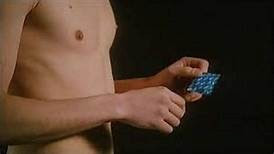the film is a mensch
by Douglas Messerli
David Fourier (screenwriter and director) Des
majorettes dans l’espace (Marjorettes in Space) / 1996
The French award-winning LGBTQ 1996 film Des
majorettes dans l'espace (Majorettes in Space) is a film of
definition, a comic study of Aristotelian deductive logic that attempts to
explain gay values by spoofing standard logic.
It
begins with two simple presumptions: “Of all living beings, only man knows he
is going to die. Of all living beings, only man is capable of humor and
poetry.” It then introduces three living beings: Catherine, Laurent, and
Vincent. Vincent, the narrative voice reports, is a homosexual.
“Otherwise,” the narrator continues, “Catherine and Laurent would have
dozens and dozens of children. Which is impossible because their car is too
small.”
The
image shifts once more to nature where the narrator takes us from one tree to
many, a group of trees, he posits, being called a forest. A group of people
often make up a march, in this case many homosexuals celebrating in a Gay Pride
parade. It is a demonstration by Vincent and his friends, asserts our
disembodied voice, to show that they exist and to claim the same rights as
heterosexuals like Catherine and Laurent. This proves that homosexuals have a
lot of humor, the unsaid presumption of course being that Laurent and his
friends are therefore human beings.
Two nude figures running near the forest reveal that Catherine and
Laurent are not at the march. “They are in the forest and are going to make
love.” Like most human beings they regularly make love, except for,” our
narrator notes, “the astronauts on Soyouz 27—my own addendum: for those of you
who may have forgotten, Soyouz 27 was the 1978 Soviet crewed spacecraft which
flew to the orbiting Salyut 6 space station—“junior majorettes, and
Jean-Paul”—who was the Pope of the Roman Catholic Church from 1978-2005.
Dimitri and Igor, the cosmonauts aboard Soyouz 27, so we are told, are
heterosexuals, and heterosexuals of the same sex do not make love
together...the narrator pauses...“unless the mission is prolonged.”
And here this charming philosophical treatise collapses into something
quite different from what so far we have been led to expect, noting that Igor
has forgotten the condoms so Dimitri is sulking. The junior majorettes don’t
make love, the narrator argues, because they are too young. In the new
illogical logic which narrator has now established, John-Paul is described as
being “a rare and resistant (they show him being shot in an assassination
attempt in 1981) being called a Pope. He lives in airports and with invisible
beings in space, sorts of cosmonauts.”
The Pope, it goes without the narrator saying it, believes in neither
condoms nor in homosexuals like Vincent.
Meanwhile, in order to avoid thinking of Igor, Dimitri has hung pictures
of majorettes in his bedroom on Soyouz 27. Yet we are told there are no real
majorettes in space because when you throw a baton it does not fall back.
Besides booties, worn by majorettes, are outlawed in outer space, just as we
might remind ourselves without the narrator needing to bother, are condoms and
homosexuals outlawed by the Pope.
The narrator now reveals that this may be the last time that Vincent
attends the Gay Pride parade since he is ill. “Vincent has AIDS. AIDS is a
killer disease transmitted by blood and sexual secretions.” John Paul is old.
He will soon die. Vincent is young. He will soon die. Deductive logic has no
power in the world in which AIDS exists. The narrator cannot offer any further
rational deductions, so we are now forced to make our own.
Evidently, Vincent has not used a condom, perhaps become the Pope has
outlawed them. And now Vincent is going die at age 20, and being a human being,
he knows it. He soon will no longer exist, despite all his and his friends
attempts to declare that homosexuals do, in fact, exist.
A
bootie is also a slang word in English for the ass, which is the entry, for
most gay men, of sexual secretions. Igor and Dimitri would not need condoms in
space if there were no AIDS because they would not have children, who generally
know nothing about death until they grow up. Even though we know gravity
exists, it does not exist space, where the invisible beings with whom the Pope
communicates are believed to exist.
And while homosexuality is not permitted by the Pope, a cosmonaut can
still imagine having sex with a child majorette.
This film won the 1997 BAFTA Award for the Best Short Film and the 1998
César Award for Best Short Film, evidently for its sense of humor. This film is
evidently a human being. But let us hope it does die.
Los Angeles, February 18, 2021
Reprinted from My Queer Cinema blog and
World Cinema Review (February 2021).




No comments:
Post a Comment